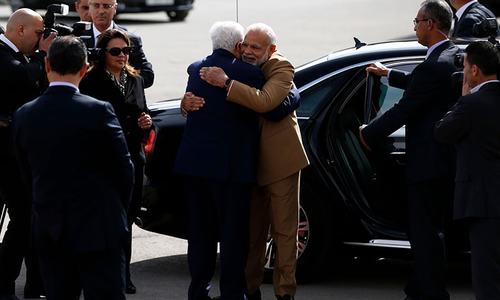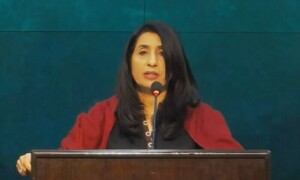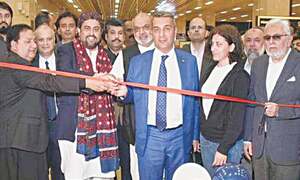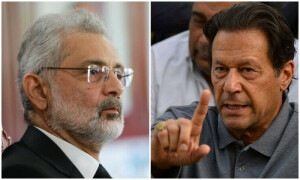
WELL-MEANING editorial writers have periodically criticised Prime Minister Modi for speaking irresponsibly in parliament and outside. Such criticism is usually about the style, not so much about the substance of his politics.
Why should Mr Modi be different from who he essentially is, particularly when he seems to be popular in being who he is? Why should he not say what his opponents don’t what him to say and say only things they want to hear?
He turns a blind eye to rampaging Hindutva mobs, cow vigilantes and so on, so his opponents complain. But people elected him for that, or possibly worse.
Why should he change his ideas and beliefs according to his opponent’s preferences? It’s a bit far-fetched to elect someone who spent all his life dreaming of a majoritarian state in India and after electing him expect him to abide by a secular, syncretic rule book, which his tutored mind never allowed to be ever accepted.
If Mr Modi says, as he said as chief minister of Gujarat, that Indian Muslims were or are “Mian Musharraf ki aulad”, (Gen Musharraf’s offspring) one can disagree with him, but people who elected him to lead the country evidently don’t care, or worse, they hold a similar view.
His opponents may not like to see Mr Modi elected again since they disagree with him on critical matters of democratic governance. But can the opponents elect a new people, as Bertolt Brecht asked?
Why do we yearn for him to be what he is not, and perhaps should never be? Imagine Mr Modi writing amazing books on history, or delivering informed speeches in parliament and at global summits, replete with nuanced reasoning and soft-spoken wisdom in brilliant English and an aesthetically appealing mélange of Hindi and Urdu, which is always pleasing to the ears. We should clearly consider ourselves lucky that Mr Modi is not Jawaharlal Nehru.
Imagine Mr Modi writing amazing books on history, or delivering informed speeches in parliament and at global summits.
Or imagine Nehru writing in his Discovery of India that transplant surgery began in Vedic India or campaigning for a temple in Ayodhya instead of chiding, as he did, the chief minister of Uttar Pradesh for mishandling the issue, or if he conjured hurtful imagery about Muslims who stayed back after Partition, calling them ‘Pakistani agents’ or some such commonly used insult. Isn’t it a blessing that Modi is not Nehru?
Imagine a well-spoken Modi, who had a scientific temper, who wrote academic books but believed in majoritarian rule.
Having said that, Indians have to come to grips with their elusive and very complex social reality, a reality they often tend to dismiss with easy, terse and untenable explanations, turning away from unpleasant facts, in the manner of those they readily criticise.
What we can do and should do is try to engage with the way people think or behave, to figure out why they seem to have deserted Nehru and embraced Modi. It is both an art and a necessity that has no substitute.
It cannot be that people when they support, say, the Communist Party are ‘cadre’ but when they cross over to the Bharatiya Janata Party or the Trinamool Congress en masse, as they did in West Bengal, they become ‘lumpen’.
Who are the people who raped and killed without remorse in Gujarat? Where did the political class miss the trick? Could the frenzied mob not have been pre-empted with better education, at the risk of sounding clichéd, and with genuine inculcation of faith in fair and equal society, could people not be moulded as democrats of agreeable hue to avert the kind of prejudice and the scale of tragedy India is exposed to ever so often?
Whose fault is it that people have deserted the centrist and leftist planks to veer to the rightward drift of the Indian nation? It’s a complex question with no ready answers.
Hindutva groups are doing social engineering, or so we try to reason. It is thus that they are tweaking old caste and class contradictions to assemble a new identity all steeped in narrow religion and narrower nationhood.
The assumption here is that Dalits and tribespeople, Muslims and other religious minorities, are being tinkered with to produce an angrier new identity. But the majority? A book I picked up at the Riverside Church in New York, where Martin Luther King delivered one of his iconic speeches, seems to question that assumption.
White Trash: The 400-Year Untold History of Class in America by Nancy Isenberg put the focus on a common blind spot we are generally unaware of in our understanding of social tensions, including, in India’s case, caste frictions and class identities.
In Harper Lee’s To Kill A Mockingbird a black man (read Dalit) is accused of raping a white (read Brahmin) girl in a racially segregated southern district. Everyone’s sympathy goes to Tom Robinson, falsely accused of the crime and to Atticus Finch the white lawyer who must defend a black man in a white-only court.
Isenberg, however, turns the gaze on the “poor white girl” Mayella Ewell. “The shabbily attired Mayella is cowed by her bully of a father, a scrawny man seen in overalls, who is devoid of merit or morality.” The Ewells were members of the terminally poor. In fact, as Isenberg says, they were regarded as “human waste”.
Or, as Lee observed: “No truant officers could keep their numerous offspring in school; no public health officer could free them from congenital defects, various worms, and diseases indigenous to filthy surroundings.” The Ewells lived behind the town dump, which they combed every day. Their rundown shack was once a “Negro cabin”.
To the town folk the Ewell children were simply “dirty-faced ones at the windows when one passed”. It is their offspring that shore up Donald Trump and Narendra Modi today. To mock them as tea vendors or pakora sellers is to undermine the Nehruvian argument.
The writer is Dawn’s correspondent in Delhi.
Published in Dawn, February 13th, 2018















































